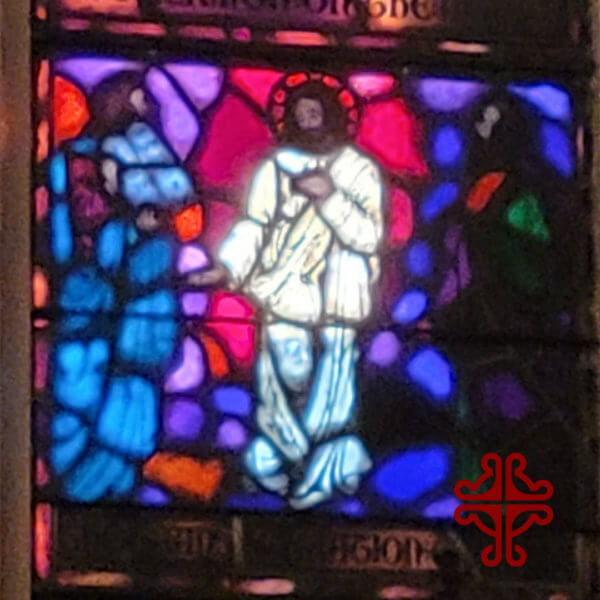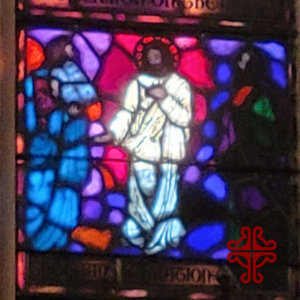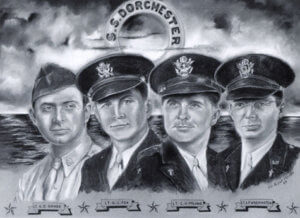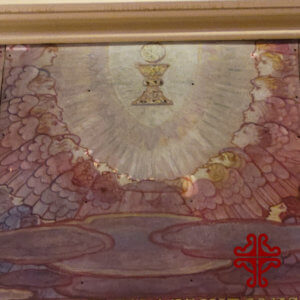
Eye Contact
And Jesus said to them: “Are you able to drink the cup that I drink?” (Mk 10:38)
 Years ago, our Danish neighbor invited Josephine and me to their home for dinner. Upon arriving we realized this was a special occasion. All the guests, about ten other couples, were Danes. It was an elegant event. Now the Danes are no strangers to alcohol. Glasses were raised frequently throughout the meal. I learned then that as you raise your glass and say Skaal, you must lock eyes with your drinking partner. Sneaking a sip from your glass without exchanging and maintaining eye contact with a neighbor is a serious breach of etiquette. Truly I say unto you, getting through the evening was exhausting.
Years ago, our Danish neighbor invited Josephine and me to their home for dinner. Upon arriving we realized this was a special occasion. All the guests, about ten other couples, were Danes. It was an elegant event. Now the Danes are no strangers to alcohol. Glasses were raised frequently throughout the meal. I learned then that as you raise your glass and say Skaal, you must lock eyes with your drinking partner. Sneaking a sip from your glass without exchanging and maintaining eye contact with a neighbor is a serious breach of etiquette. Truly I say unto you, getting through the evening was exhausting.
Wikipedia reveals the ancient German custom of eye contact is an expression of trust. It prevents your drinking partner from drawing his sword or tipping poison into your glass. For me, I prefer to raise my glass to “l’chaim!” To life! That is the cup that Jesus offers in the cup we raise. To life! In accepting that cup, we accept the sorrows and pain that lie ahead on our journey to the true life.
What Lies Ahead
This morning, Jesus and the disciples turn onto the final leg of their journey to Jerusalem. Stepping ahead, Jesus confidently leads the way. The disciples follow, fearful of what awaits them. Moments before we encounter them this morning, Jesus takes them aside. For the third time, Jesus discloses what lies ahead on their path. He reminds them that in Jerusalem he will be delivered unto torture and death by the priests, scribes and Gentiles and, after three days, rise again. (Mk 10:32-34)
At that moment, the battery in James and John’s hearing aid fails them. Out of fear, disbelief or rejection they cannot hear what Jesus tells them. Unable to square their vision of a conquering messiah with the tragedy that awaits them, they assume they are going to a coronation.[i] Out of a sense of self-importance, they petition to share equally in their mistaken vision of glory. Their request stirs up feelings of jealousy amongst the others as they hear the two sons of Zebedee lobbying for reward at their expense. Having followed Jesus from the beginning, all twelve assume they deserve cabinet positions in the court of their victorious messiah.
 From our privileged position as readers of Mark’s gospel it is tempting to criticize the disciples. But they are only human, yielding to human impulses, unable to see beyond human limitations. They have been witness to the signs and wonders along the way. But fear and disbelief blind them to the role of true servanthood that walks before them in the person of Jesus. Despite their assurance of loyalty, all betray or desert Jesus in the days ahead. James and John fall asleep in Gethsemane. They fail to comfort Jesus during his agony in the Garden. Afraid for their lives, the disciples deny or abandon him. None are present on Calvary; an outsider, a stranger, a Gentile is commanded to shoulder the burden of his cross.
From our privileged position as readers of Mark’s gospel it is tempting to criticize the disciples. But they are only human, yielding to human impulses, unable to see beyond human limitations. They have been witness to the signs and wonders along the way. But fear and disbelief blind them to the role of true servanthood that walks before them in the person of Jesus. Despite their assurance of loyalty, all betray or desert Jesus in the days ahead. James and John fall asleep in Gethsemane. They fail to comfort Jesus during his agony in the Garden. Afraid for their lives, the disciples deny or abandon him. None are present on Calvary; an outsider, a stranger, a Gentile is commanded to shoulder the burden of his cross.
Now Jesus says to them: “Are you able to drink the cup that I drink?”
How easy for them to reply: “Yes, we are able!” as they know not what they ask. Misled by their vision of glory, they unknowingly ask to share in his painful destiny.[ii] The positions they seek on Jesus’ right and left hand are reserved for two criminals who share the shameful death of crucifixion. The disciples cannot know the price they must pay. Only Jesus understands the bitterness that lies in that cup. The cup that Jesus will drink overflows with the sins, the suffering, the pain of all humanity. No wonder, then that Jesus says: “My soul is sorrowful to the point of death” (Mat 26:38). His agony is so intense that “his sweat falls to the ground like great drops of blood” (Lk 22:44). Alone in Gethsemane, his disciples sleeping, he cries out “My Father, if it is possible, let this cup pass me by.”(Mat 26:39) [iii]
The Cup
In his book, Can you Drink the Cup?, theologian and spiritual author Henri Nouwen reminds us that the cup Jesus will drink is neither a symbol of victory nor a symbol of death. It is a symbol of life. A symbol of life filled with all the sorrows and joys that the world holds. The cup we receive at the rail is God’s blessing as we travel our way to salvation.[iv]
Jesus knows the troubled road the disciples will travel the days ahead. Lovingly, he accepts their foolishness and human weakness.[v] Generously, he comforts them: “Yes, the cup I drink, you will, also.” They too will walk a path of sorrows on their path to true discipleship. That path ends in torture and martyrdom for all but one.
The cost of discipleship is high. The German theologian Dietrich Bonhoeffer, himself martyred by the Third Reich tells us: “Discipleship…is costly because it costs a person their life…it is grace because it is the road to the only true life.”[1] Jesus tells us that the Son of Man came not to be served, but to serve and to give his life as a ransom for many. We are the many. The joy of our redemption comes at the price of Christ’s death and resurrection.[vi]
 We are surrounded in life by so many who accept the price of true discipleship. Consider the four young chaplains aboard the WW II Army troop ship Dorchester. At one o’clock in the morning, just south of Greenland, the ship is mortally wounded by a German torpedo. She will sink in 20 minutes. There are not enough life jackets to go around. In that scene of confusion and terror, each chaplain removes his life jacket. He buckles it on another passenger. The four are last seen praying, guiding and comforting terrified passengers. Many of the 900 passengers will perish, yet 250 lives are saved, clawed back from death by nearby Coast Guard cutters.[2]
We are surrounded in life by so many who accept the price of true discipleship. Consider the four young chaplains aboard the WW II Army troop ship Dorchester. At one o’clock in the morning, just south of Greenland, the ship is mortally wounded by a German torpedo. She will sink in 20 minutes. There are not enough life jackets to go around. In that scene of confusion and terror, each chaplain removes his life jacket. He buckles it on another passenger. The four are last seen praying, guiding and comforting terrified passengers. Many of the 900 passengers will perish, yet 250 lives are saved, clawed back from death by nearby Coast Guard cutters.[2]
Were those four chaplains afraid? It is not for us to know. What we do know is that those four accepted the cup of life offered to them. Out of the bitterness of that cup flows the gift of joy received from their sacrifice.
And now Jesus asks us: “Are you able to drink the cup that I drink?”
This is the question that will have a different meaning every day of our lives.[vii] We are surrounded by examples of so many who accept Jesus’ invitation. There are the first responders who run toward danger, often at the cost of their lives so that others may live. We remember Houston Police Sgt. Steve Perez who drowned in Hurricane Harvey’s floodwaters in his headlong rush to save others. “I have a job to do,” he said when his wife asked him to stay behind. Dramatic examples, of course. Less dramatic are the thousands of health care workers who quietly accept that cup and put their lives on the line for us. Every day they run toward danger to protect us from the invisible deadly virus.
The cup of life these past 19 months overflows with bitterness. Loved ones everywhere have been isolated from family, often to die alone. As the danger subsides many are now able to celebrate memorial services for those taken from us during COVID. Last month I attended the memorial for a friend, one of the first in Connecticut to die from the virus. I was moved by the joy that flowed out of his son’s words as he struggled with tears to express his love of their life together.
 How wise are these words of Henri Nouwen: “The cup of life is the cup of joy as much as it is the cup of sorrow. It is the cup in which sorrows and joys, sadness and gladness, mourning and dancing are never separated. If joys could not be where sorrows are, the cup of life would never be drinkable. That is why we have to hold the cup in our hands and look carefully to see the joys hidden in our sorrows.”[viii]
How wise are these words of Henri Nouwen: “The cup of life is the cup of joy as much as it is the cup of sorrow. It is the cup in which sorrows and joys, sadness and gladness, mourning and dancing are never separated. If joys could not be where sorrows are, the cup of life would never be drinkable. That is why we have to hold the cup in our hands and look carefully to see the joys hidden in our sorrows.”[viii]
Works Referenced:
This is a sermon delivered to the congregation of Emmanuel Church, Newport, RI on October 17, 2021.
I am indebted to the following for their insights into the lectionary: William L. Lane,
The Gospel of Mark, Eerdmans (1974); Henri J. M. Nouwen, Can You Drink the Cup?, Ave Maria Press (2006) Kindle; Fleming Rutledge, The Crucifixion: Understanding the Death of Jesus Christ, Eerdmans (2015)
Roger C. Bullard, September October 17, 2021
[1] Dietrich Bonhoeffer, The Cost of Discipleship. SCM Press
[2] Dan Kurzman, in: No Greater Glory: The Four Immortal Chaplains and the Sinking of the Dorchester in World War II, Random House, 2004
[i] Rutledge, p. 291
[ii] Lane, p.379
[iii] Nouwen, p. 40
[iv] ibid, p115
[v] op.cit, Rutledge, p. 292
[vi] Ibid, p 289
[vii] op.cit, Nouwen p. 115
[viii] ibid, p.51
